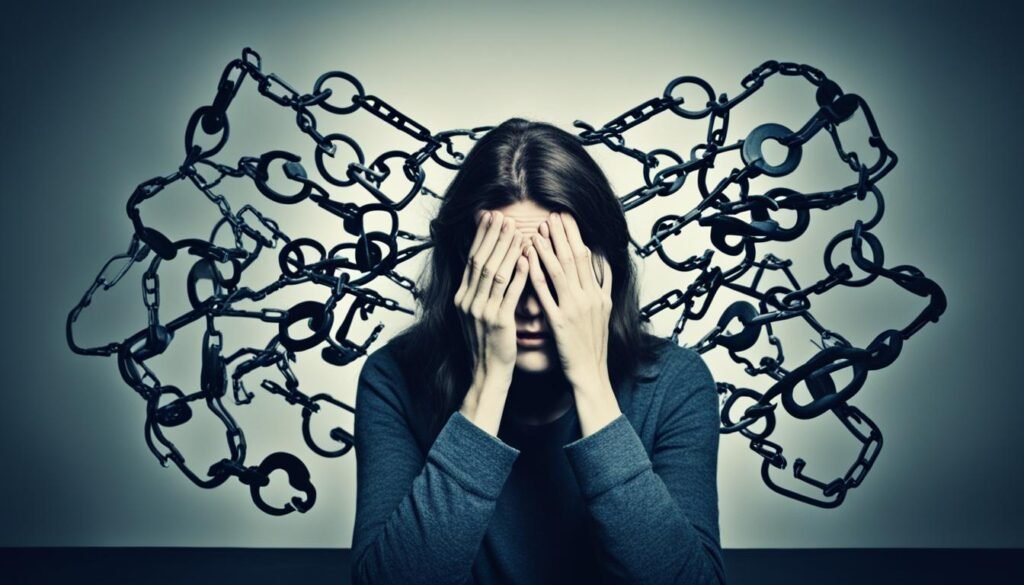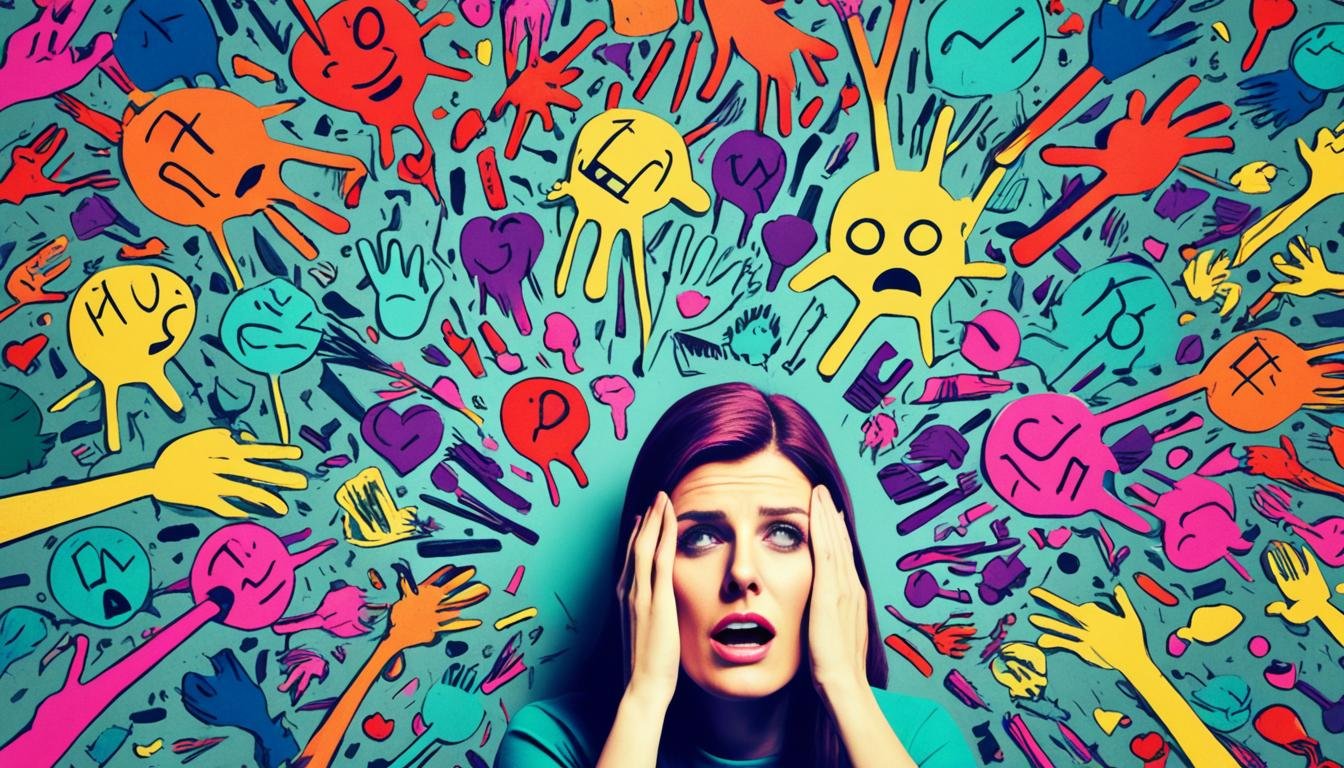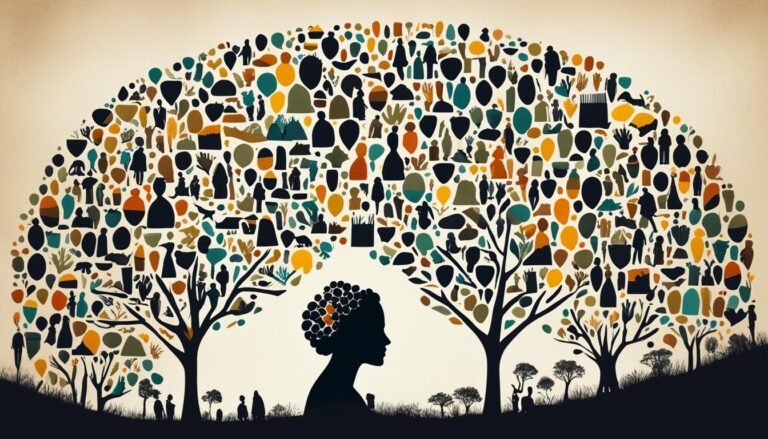How does poor mental health and wellbeing impact society?
Have you ever stopped to think about the wide-reaching effects of mental health issues in our community? It’s not just about a single person. It affects everyone and everything from how we get along to our money. You might have seen someone you care about go through mental health problems. Or maybe you’ve felt anxiety or depression yourself. This is more than a story far away. It’s something many people face every day in South Africa.
The talk around mental health is becoming more important in South Africa. It’s clear that when someone struggles with their mental health, it doesn’t just affect them. Around half to four-fifths of people with mental health issues also have trouble sleeping. This is much higher than the rest of the population1. This is just the tip of the iceberg. Mental health problems reach out and touch our public health, money, schools, and communities too.
The WHO tells us that many places are facing heavy burdens because of mental health issues. South Africa is no different. When people’s mental health suffers, workplaces can see less done and more people missing work. This puts a strain on the country’s funds2. Struggling with stress at work doesn’t just make things tough quietly. It can lead to more accidents and illnesses on the job2. Plus, those with mental health problems are more likely to smoke1.
Now, picture a place where lots of people deal with mental health issues. This place will struggle from personal pain, as well as problems with money and society. In the UK, up to 40% of time off work is because of mental health issues. This shows just how vital mental health is for our work and quality of life2. It’s critical that we face these issues in South Africa with care and speed to boost our health and society as a whole.
Key Takeaways
- Mental health issues hit not only those affected but also society as a whole.
- Sleeping troubles are widespread among those with mental health issues, hitting 50-80% of them1.
- Mental illness leads to more missed work and less productivity2.
- There’s a clear link between a lot of stress, mental health problems, and health risks like smoking1.
- Working on mental health in a big way can make communities and societies healthier and better off.
The Impact on Social Relationships and Dynamics
Poor mental health can affect how we interact with others. It influences family life, how we connect with friends, and our role in the community. These effects are huge and touch many parts of our lives. It’s worth looking closely at each area to understand better.
Family Relationships
When someone in the family struggles mentally, it affects everyone. This can cause problems between family members over time. Yet, having friends and support can make a big difference3. They provide a safety net when things get tough. Besides, good relationships and health go hand in hand. They encourage us to live healthier lives and enjoy stronger ties with our family3. But, if there’s violence at home, it really harms the kids’ ability to cope and their mental health4. That’s why keeping family relationships healthy and supportive is key to everyone’s happiness.
Friendships and Social Connections
Friends and being part of a social group are crucial for our well-being. Being part of activities, both formal and casual, leads to better health3. On the flip side, avoiding social situations impacts our mental state. It can lead to a harmful cycle where feeling worse makes us avoid others even more3. For people lacking enough food, depression might hit harder. This is seen more in those with food concerns who are part of low-income support programs4. Building a strong network of friends and family helps break this cycle. It’s important for good mental health and community health.
Community Involvement
If a family deals with mental health issues, they might step back from the community. This happens due to the fear of how others might see them or the heavy load of care they bear. However, being part of social circles is great for mental health5. It acts like a shield for our minds, especially in certain groups4. To build healthier, more robust communities, we must fight mental health stigma and encourage everyone to engage with their community.
Economic Consequences of Poor Mental Health
Poor mental health hurts the economy. It lowers work productivity, raises healthcare costs, and worsens poverty and social gaps. These issues impact both people and society at large.
Workplace Productivity
Mental health battles lead to lower productivity at work. The costs of these issues can be big because of missing work or not fully working when present6. A study even said more effort is needed in mental health services to help work productivity and cut costs for businesses6.

Healthcare Costs
More money is spent on healthcare because of poor mental health. Just in the U.S. in 2020, about $280 billion went to mental healthcare, mostly through Medicaid7. Mental health problems cost a lot in the European Union too, being 4.1% of the entire GDP. This includes direct healthcare spending and other costs like lost productivity8. These figures show the need to smartly spend on mental health for better healthcare system management.
Poverty and Social Disparities
Poor mental health and poverty are tightly linked. It forms a circle where each makes the other worse. People in lower economic brackets face more mental health challenges, which can hurt their financial chances and health6. In Uganda, a study showed how poverty and tough life events can raise the chances of getting depressed6.
The pandemic made things harder for many, with half of women and a third of men seeing their mental health decline. This was often due to social and economic conditions7. Focusing on these root problems can help stop this cycle, benefiting both single people and entire communities.
Mental Health and Educational Outcomes
The link between mental health and educational results is clear. Students with mental health issues often face difficulties in school. This can lead to lower grades and a higher chance of dropping out9. Sadly, this can limit their future success.
High stress and anxiety are big problems for student success. 50% of U.S. high school students say these issues make learning hard9. What’s more, students with learning differences often deal with more anxiety. This makes it even harder for them to do well in school9.
Getting less education can predict tough times in the future. It’s also tied to poorer mental health. Things like job, money, and the level of education all shape mental well-being10. Improving in school may help in both financial and mental health ways.
Helping mental health in schools is key to better behavior and less dropout. Sadly, not even half of high school students feel they can talk to an adult at school when they’re sad9. This shows why schools need better mental health support, like counseling. The WISE program, for example, offers help anytime, boosting students’ health and school performance9.
A study in Zimbabwe also shows how education helps mental health. Every extra year of school means less anxiety and depression later in life11. This is true even more for girls and students in rural areas11. It proves the wide-reaching benefits of getting more education.
Focusing on mental health in school helps students become stronger and more resourceful. This needs many changes, like better mental health care and school policies. Preparing to face these challenges makes for a better, more successful school life and future.
How Does Poor Mental Health and Wellbeing Impact Society?
Poor mental health and wellbeing hit society hard in many ways. They link to drug abuse, criminal acts, and health issues, showing a complex web.
Substance Abuse and Dependency
Struggling with mental health can push people towards drugs and addiction. This problem gets worse without enough help12. Over 1 in 5 US adults faces mental health issues, making this more critical13. Tough life situations can push someone towards substance abuse12.
Criminal Behavior and Incarceration
There’s a strong connection between mental health struggles and crime. Around 1 in 25 US adults with severe mental problems end up in jail, because of acts like robbery1213. Getting mental help early can lower these crime numbers12.
Physical Health and Comorbidity
Those with mental health issues often battle with several physical problems too. Things like loud noises and dirty air don’t help, as they add stress14. Being in nature or around green areas reduces stress, serving as powerful medicine14. Plus, having clean air and water is a must for their physical health14.

Conclusion
The impact of poor mental health goes far. It affects family bonds and the economy. For example, in Wales, kids from poorer homes are four times more likely to have serious mental health issues by the time they’re 11 than those from richer families15. And these challenges early on can lower school success and change how we interact with others for life.
Not just in Wales, but also in Northern Ireland and Canada we see big health problems linked to mental illness. In Canada, people who feel depressed say they have three times more health issues than others16. And sadly, almost a third of young people’s suicides in Northern Ireland happen when they’re drunk or high17. These facts show that we need specific plans and support to deal with these issues right away.
We must think about how policies can help with these big problems. Mental health aid must be part of everything, from how we spend money to our healthcare and what we do for the community. Changing how we deal with mental health together is key to a stronger society.
FAQ
How does poor mental health and wellbeing impact society?
How does mental health affect family relationships?
What impact does poor mental health have on friendships and social connections?
How does mental illness affect community involvement?
How does poor mental health impact workplace productivity?
What are the economic consequences of poor mental health?
How does mental health affect educational outcomes?
What is the relationship between mental health and substance abuse?
How does poor mental health relate to criminal behavior and incarceration?
What is the connection between mental health and physical health?
Source Links
- How Does Mental Health Affect Physical Health? – https://www.webmd.com/mental-health/how-does-mental-health-affect-physical-health
- Mental well-being at the workplace – https://www.ncbi.nlm.nih.gov/pmc/articles/PMC3062016/
- Social Relationships and Health: A Flashpoint for Health Policy – https://www.ncbi.nlm.nih.gov/pmc/articles/PMC3150158/
- Social Determinants of Mental Health: Where We Are and Where We Need to Go – https://www.ncbi.nlm.nih.gov/pmc/articles/PMC6181118/
- The relationship between wellbeing and health – https://assets.publishing.service.gov.uk/media/5a7baa00ed915d4147621d62/The_relationship_between_wellbeing_and_health.pdf
- Social, economic, human rights and political challenges to global mental health – https://www.ncbi.nlm.nih.gov/pmc/articles/PMC3178190/
- Reducing the Economic Burden of Unmet Mental Health Needs | CEA | The White House – https://www.whitehouse.gov/cea/written-materials/2022/05/31/reducing-the-economic-burden-of-unmet-mental-health-needs/
- The social and economic impact of mental health – https://www.mapfre.com/en/insights/health/the-social-and-economic-impact-of-mental-health/
- Understanding the Impact of Mental Health on Academic Performance | Independent School Management | Advancing School Leadership—Enriching The Student Experience – https://isminc.com/advisory/publications/the-source/understanding-impact-mental-health-academic-performance
- How does Education Affect Mental Health? – https://www.news-medical.net/health/How-does-Education-Affect-Mental-Health.aspx
- Mental health effects of education – https://www.ncbi.nlm.nih.gov/pmc/articles/PMC9796491/
- Mental health – https://www.who.int/news-room/fact-sheets/detail/mental-health-strengthening-our-response
- About Mental Health – https://www.cdc.gov/mentalhealth/learn/index.htm
- Mental Health and Well-being | Copernicus Health Hub – https://health.hub.copernicus.eu/mental-health-and-well-being
- Poverty and mental health: it’s a two-way street – https://research.senedd.wales/research-articles/poverty-and-mental-health-it-s-a-two-way-street/
- The Relationship between Mental Health, Mental Illness and Chronic Physical Conditions – https://ontario.cmha.ca/documents/the-relationship-between-mental-health-mental-illness-and-chronic-physical-conditions/
- Introduction to mental health – https://www.nidirect.gov.uk/articles/introduction-mental-health






